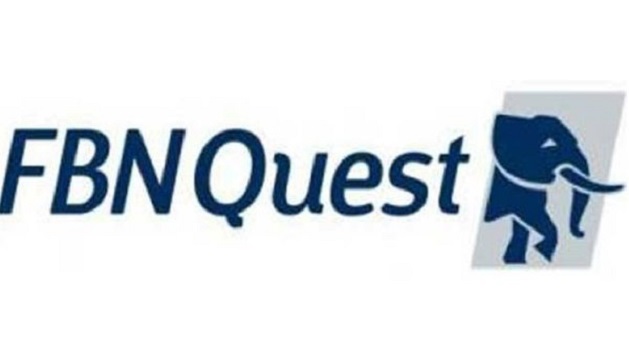E-Financial
FBNQuest Asset Management Discusses ABC of Personal Finance Part 2

Ability to Take Risk
This is your financial capacity to take risks. It depends on factors such as your income, savings, financial obligations, and investment time horizon.

For example, higher income and substantial savings can increase your ability to take risks, high debt levels or significant financial responsibilities (like supporting a family) can reduce your ability to take risks, the longer your investment time frame, the more risk you can typically afford to take, as you have more time to recover from potential losses.
Balancing Willingness and Ability
Effective financial planning involves balancing your willingness and ability to take risks. Here are a few steps to consider: Assess Your Risk Tolerance, Evaluate Your Financial Situation, Diversify Your Investments and Adjust Over Time.
Understanding your willingness and ability to take risks helps you make informed investment decisions that align with your financial goals and comfort level.
- Liquidity Needs
This refers to how quickly and easily an asset can be converted into cash without significantly affecting its value.
Liquidity need is the requirement to have access to cash or easily convertible assets to meet short-term financial obligations or unexpected expenses. While liquid assets offer safety and flexibility, they typically yield lower returns compared to less liquid investments.
Balancing your portfolio to meet both liquidity needs, and long-term growth goals is essential. Understanding your liquidity needs ensures you have the right mix of assets to meet both immediate and future financial goals.
- The investment duration
This directly influences the investment objective. In essence, the longer the investment horizon, the greater the potential for risk and reward.
However, it’s crucial to align the investment duration with the investment objective to achieve financial goals effectively.
Short-term objectives: Investors typically seek investments that offer liquidity and stability. Examples include money market funds, certificates of deposit (CDs), and short-term government bonds.
Medium-term objectives: These investors often balance growth and income. They may consider a mix of stocks, bonds, and mutual funds.
Long-term objectives: Investors with a long-term horizon can tolerate higher risk for potentially higher returns. They may invest in stocks, real estate, and other growth-oriented assets.
Example: A young investor aiming to accumulate wealth for retirement (long-term objective) might invest in stocks, which historically offer higher returns over the long run while an investor nearing retirement seeking steady income (short-term objective) might prefer bonds and dividend-paying stocks.
- Understanding Various Investment Vehicle
An investment vehicle is a financial product or account that allows individuals and institutional investors to invest their money with the aim of generating profit or returns. These vehicles come in various forms, each carrying its own risks and rewards.
The best investment vehicle for you will depend on your individual circumstances and financial goals. Consulting with a financial advisor can help you make informed decisions. Here are some of the most popular investment vehicles:
- Stocks: A type of investment that gives you partial ownership of a publicly traded company. Such ownership entitles you to any dividends that may be paid, and you may experience gains or losses on your holdings over time. Potential for high returns but higher risk. E.g. shares of FBN holdings.
- Bonds: A debt instrument, a bond is essentially a loan that you are giving to a governmental entity or a company in exchange for a pre-set interest rate. Typically, the bond pays periodic interest (coupon payments) during its term, and it matures on a specific date. Steady income but moderate risk.
- Mutual Funds: An investment vehicle that allows you to invest your money in a professionally managed portfolio of assets that, depending on the specific fund, could contain a variety of stocks, bonds, or other investments. E.g. FBN Money Market Fund.
- Exchange-Traded Funds (ETFs): Like mutual funds but traded on stock exchanges, offering more flexibility and potentially lower costs.
- Real Estate: Investing in physical property, such as houses, apartments, or commercial buildings.
- Derivatives: Financial contracts based on an underlying asset (e.g., options, futures). This is also a high-risk investment.
- Commodities: Physical assets like gold, oil, or agricultural products.
Other consideration when choosing an investment vehicle
- Diversification benefit Fees and expenses Reputation of the Financial Advisor
- Stay Informed & Continuous learning (A way to take ownership of your finances)
Certainly, improving your financial literacy is a valuable endeavour that can empower you to make informed decisions and better manage your personal finances.
Remember, continuous learning is key to improving your financial literacy. Here are some effective ways to enhance your financial knowledge:
- Read Books and Magazines Visit Financial Websites
- Attend Local Presentations/Webinar Seek Expert Advice
Common Investment Mistakes
Here we highlight the past mistakes people have made while making an investment decision.
The aim is to prevent us from doing same and better equip ourselves to make better investment decisions. Investing is a journey, and learning from missteps can lead to better outcomes.
- Not setting financial goals Not diversifying
- Not learning from your mistakes Not doing your research
In conclusion, monitoring and reassessment are crucial components of successful personal finance management. It is not just enough to execute the actions above; it is important to imbibe the culture of discipline to achieve your financial objectives.
Remember, the journey to financial well-being is a marathon, not a sprint. Stay committed, stay informed, and your future self will thank you.
E-Financial
Sterling Bank Pledges ₦2bn to Fully Fund University Scholarships

Sterling Bank has launched a ₦2 billion scholarship initiative to support Nigerian students in private universities. The program, Beyond Education, was unveiled on Democracy Day and aims to remove financial barriers to higher learning.

The bank will fully sponsor 600 students from across Nigeria’s 36 states and the FCT to study Technology, Finance, Sales, and Public Health at Miva University, founded by Sim Shagaya. The selection process is merit-based, with candidates nominated by themselves or others, and final selection determined through public voting open to Sterling account holders.
Sterling Bank’s CEO, Abubakar Suleiman, described the initiative as an investment in Nigeria’s future, aligning with the bank’s commitment to Health, Education, Agriculture, Renewable Energy, and Transportation. The bank has already deployed over half a trillion naira in financing across these sectors.
According to Obinna Ukachukwu, Growth Executive at Sterling Bank, the program is about creating opportunities beyond education. The bank is shifting from short-term philanthropy to long-term ecosystem development, with investments in digitized healthcare, school financing, agricultural cooperatives, solar energy, and transport systems.
“Nigeria’s progress requires action,” Suleiman said. “We are funding the future architects of the country—those who will build the businesses, institutions, and innovations needed for national prosperity.”
Nominations for the Beyond Education scholarships are now open at www.sterling.ng/FUTURE. The initiative sets a precedent for private-sector-driven education investment, where success is measured not just in profit, but in people empowered.
E-Financial
FG to Train 100,000 Youths Annually in Forex Trading and Financial Skills

Federal Government of Nigeria has signed a Memorandum of Understanding (MoU) with Investonaire Academy to train 100,000 young Nigerians annually in forex trading, financial planning, and risk management.

The agreement, signed in Abuja, was announced by Omolara Esan, Director of Information and Public Relations at the Federal Ministry of Youth Development. According to her, the initiative is part of the government’s broader strategy to reduce youth unemployment and enhance financial inclusion.
At the signing ceremony, Minister of Youth Development, Comrade Ayodele Olawande, described the partnership as a milestone in the ministry’s efforts to equip young Nigerians with practical financial skills. He emphasized that the programme would foster critical thinking, improve digital literacy, and expand access to global economic opportunities.
Speaking on the collaboration, Dr. Enefola Odiba, International Programme Director at Investonaire Academy, highlighted the importance of empowering youth with relevant financial and digital skills. He described young people as essential drivers of innovation and national development.
The ministry assured that the programme would be implemented with transparency and measurable outcomes, ensuring that participants gain practical expertise in forex trading and financial planning.
The Federal Government has recently intensified efforts to boost skill development across various sectors. A separate plan aims to train 100,000 artisans nationwide, following the successful upskilling of 29,000 individuals in previous phases. This initiative seeks to professionalize vocational trades, eliminate quackery, and introduce licensing systems.
Additionally, technicians from specialized institutions will receive industry-standard training to strengthen Nigeria’s labor force and increase self-reliance in skilled professions.
Through these efforts, the government hopes to position Nigerian youth for economic success both locally and globally.
E-Financial
NDIC Begins Final Settlements to Creditors of Liquidated Premier Bank

Nigeria Deposit Insurance Corporation (NDIC) has begun the final phase of liquidation for the defunct Premier Commercial Bank, initiating the payment of liquidation dividends to verified creditors, nearly 25 years after the bank’s closure.

Premier Commercial Bank had its operating license revoked by the Central Bank of Nigeria (CBN) on December 20, 2000, following findings of financial instability and regulatory non-compliance.
Since then, the NDIC has overseen the bank’s liquidation process under a winding-up order from the Federal High Court, which designated the corporation as the official liquidator.
In a public announcement, the NDIC invited all eligible creditors to visit any of its zonal offices between June 2 and June 27, 2025, to verify and claim their entitlements.
This move marks a critical milestone in the final settlement of claims related to the bank’s collapse.
To facilitate the verification process, creditors are required to present proof of deposit or shareholding, such as a passbook, chequebook, term deposit certificate, or bank statement.
Additionally, valid identification documents must be submitted, including a driver’s license, international passport, national identity card, NIN slip/card, voter’s card, or a formal identification letter from a traditional ruler or local government chairman.
The NDIC assured the public that the ongoing settlement is part of a broader effort to bring closure to longstanding claims resulting from Premier Commercial Bank’s liquidation. The process, according to the corporation, has been designed to ensure efficient disbursement to all verified stakeholders.
Premier Commercial Bank is one of 53 deposit money banks whose licenses were revoked by the CBN between 1994 and 2018 due to various violations and signs of financial distress.
These closures were followed by legal procedures appointing the NDIC to manage asset recoveries and creditor settlements.
By initiating this final phase of payment, the NDIC is reaffirming its commitment to financial system stability and depositor protection while calling on all affected individuals and institutions to complete verification processes promptly to receive their due compensation.

 General News1 day ago
General News1 day agoAfDB to Provide $184.1mfor Africa’s Largest Solar Energy, Battery Storage Project

 Telecom2 days ago
Telecom2 days agongCERT Issues High Alert to Nigerians Using Android Phones

 Telecom2 days ago
Telecom2 days agoMTN and Ecobank Launch Chess Championship to Empower Nigeria’s Youth

 News1 day ago
News1 day agoReport Reveals New Malware Posing as an AI Assistant Steals User Data

 General News2 days ago
General News2 days agoOSGOF, NASRDA Partner to Boost Geospatial Data, Others

 E-Business2 days ago
E-Business2 days agoAfrican Startups Raised $345m in Funding in May

 Telecom1 day ago
Telecom1 day agoMTN Mulls Establishment of Fintech Firm in Nigeria, Others

 General News1 day ago
General News1 day agoCourt Declines Access Bank’s Request to Freeze MTNN Account over N180Bn Claims

























